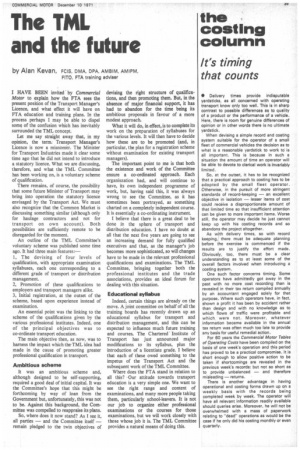costing column
Page 41

If you've noticed an error in this article please click here to report it so we can fix it.
It's timing that counts
• Delivery times provide indisputable yardsticks, as all concerned with operating transport know only too well. This is in sharp contrast to possible differences as to quality of a product or the performance of a vehicle. Here, there is room for genuine differences of opinion or in other words there is no ultimate yardstick.
When devising a simple record and costing system suitable for the operator of a small fleet of commercial vehicles the decision as to what is a reasonable yardstick to work to is all important. This is because in such a situation the amount of time an operator will be able to devote to clerical work is invariably limited.
So, at the outset, it has to be recognized that a practical approach to costing has to be adopted by the small fleet operator. Otherwise, in the pursuit of more stringent standards of record-keeping — an excellent objective in isolation — lesser items of cost could receive a disproportionate amount of that limited time so that insufficient attention can be given to more important items. Worse still, the operator may decide he just cannot keep up with his costing records and so abandons the project altogether.
As with delivery times, so with record keeping, there must be adequate planning before the exercise is commenced if the results are to justify the effort made. Obviously, too, there must be a clear understanding as to at least some of the overall factors involved when introducing a costing system.
One such factor concerns timing. Some operators have admittedly got away in the past with no more cost recording than is revealed in their tax return compiled annually by an accountant engaged solely for that purpose. Where such operators have, in fact, shown a profit it has been by accident rather than design and with no knowledge as to which flows of traffic were profitable and which were not. Moreover, whatever information became available in the annual tax return was often much too late to provide any basis for useful remedial action.
For 60 years the Commercial Motor Tables of Operating Costs have been compiled on the basis of one week's operation and this period has proved to be a practical compromise. It is short enough to allow positive action to be taken if shortcomings are revealed in the previous week's records: but not so short as to provide unbalanced — and therefore misleading — returns.
There is another advantage in having operational and costing forms drawn up on a weekly basis with the records being completed week by week. The operator will have all relevant information readily available should queries arise. Moreover, he will not be overwhelmed with a mass of paperwork relating to 'dead" operations as would be the case if he only did his costing monthly or even quarterly.




































































































